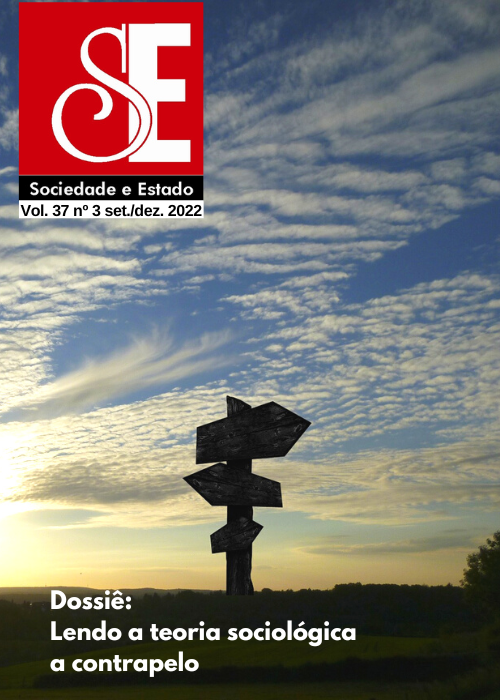Contesting Modernization in Rural Peripheral Settings: Green Revolution, Women and Entangled Paradigms under the Pioneering Lens of Cynthia Hewitt de Alcántara
DOI:
https://doi.org/10.1590/s0102-6992-202237030002Keywords:
modernization, green revolution, rural women, Cynthia Hewitt de Alcántara, sociology of knowledge, genderAbstract
The interdependent inequalities in the production and circulation of knowledge in the social sciences have marked the historical development of mostly male canons from the centers, to the detriment of the voices of women and production from the peripheries. With the impulse of the feminist wave in Latin America, the contribution of women to the construction of the social sciences in the global south has begun to have greater relevance. This article introduces for the first time the intellectual and professional trajectory of the sociologist Cynthia Hewitt de Alcántara from the gender and sociology of knowledge perspectives. Based on her written production and an in-depth interview, I focus on the author’s production during her first stay in Mexico between 1966-1985, reconstructing the interrelations between the contexts of production and her pioneering contributions contesting modernization processes within the green revolution, the situation of women in peripheral rural contexts and the entangled paradigms of the social sciences.
Downloads
References
ALATAS, Syed Farid “Academic Dependency and the Global Division of Labour in the Social Sciences”. Current Sociology, N° 6, pp. 599-613, 2003.
BEIGEL, Fernanda “Centros y periferias en la circulación internacional de conocimiento” Nueva Sociedad (245), 110-123, 2013.
BEIGEL, Fernanda “Publishing from the periphery: Structural heterogeneity and segmented circuits. The evaluation of scientific publications for tenure in Argentina’s CONICET” Current Sociology 62 (5): 743-765, 2014.
CONNELL, Raewyn. Southern Theory. The global dynamics of knowledge in social science. Australien: Allen & Unwin, 2007.
COSTA, Claudia “Lost (and Found?)Translation: Feminisms in Hemispheric Dialogue”. Latino Studies. 4, 2006.
FEDER, Ernest: Gewalt und Ausbeutung. Lateinamerikas Landwirtschaft. Hamburg: Hoffmann und Campe, 1976.
GINGRAS, Yves/MOSBAH-NATANSON, Sebastien “Where Are Social Sciences Produced?”. World Social Science Report: Knowledge Divides, UNESCO Publishing, International Social Science Council, pp. 149-153, 2010.
GÖBEL, Barbara/ MARTÍN, Eloísa (ed.) Desigualdades interdependentes e geopolítica do conhecimento: negociações, fluxos, assimetrias. Rio de Janeiro: 7Letras, 2018.
HEWITT DE ALCÁNTARA, Cynthia. Modernizing Mexican Agriculture. Socioeconomic Implications of Technological Change (1940-1970), Geneva, UNRIDS, 1976.
HEWITT DE ALCÁNTARA, Cynthia. La modernización de la agricultura agraria mexicana (1940-1970), Siglo XXI, 1978.
HEWITT DE ALCÁNTARA, Cynthia. Anthropological Perspectives on Rural Mexico, London, Routledge and Kegan Paul, International Library of Anthropology Series, 1984.
HEWITT DE ALCÁNTARA, Cynthia. Imágenes del campo: La interpretación antropológica del México rural, Mexico City: El Colegio de México, 1987.
KEIM, Wiebke “Social sciences internationally: the problem of marginalisation and its consequences for the discipline of sociology”. African Sociological Review 12 (2): 22–48, 2009.
KAY, Christoph. Latin American Theories of Development and Underdevelopment. London: Routledge, 2010.
LOWENHAUPT TSING, Anna. Friction. An ethnography of global connection. Princeton: Princeton University Press, 2005.
PERNET, Corinne “FAO from the Field and from Below: Emma Reh and the Challenges of Doing Nutrition Work in Central America”. The International History Review, 41:2, 391-406, 2019.
RATTS, Alex. Eu sou atlântica: sobre a trajetória de vida de Beatriz Nascimento. São Paulo: Instituto Kuanza, 2006.
RIBEIRO, Andrea “Vania Bambirra e as mulheres no capitalismo dependente”. Horizontes ao Sul, 2019.
SVAMPA, Maristella. Debates latinoamericanos: indianismo, desarrollo, dependencia y populismo. Buenos Aires: Edhasa, 2016.
VESSURI, Hebe et al. “Excellence of quality? Impact of the current competition regime on science and scientific publishing in Latin America and its implications for development”. Current Sociology 62 (5): 647-665, 2016.
WILDNER, Maria Belén “Vania Bambirra en Chile: Reflexiones en torno a la liberación de la mujer latinoamericana” Cuadernos del CEL Vol. IV, Nº 8, pp. 29-43, 2019.
WÖHRER, Veronika “Gender studies as a multi-centred field? Centres and peripheries in academic gender research” Feminist Theory, v. 17, n. 3, 323–343, 2016.
Downloads
Published
How to Cite
Issue
Section
License
Copyright (c) 2022 Sociedade e Estado

This work is licensed under a Creative Commons Attribution-NonCommercial 4.0 International License.




.jpg)



















